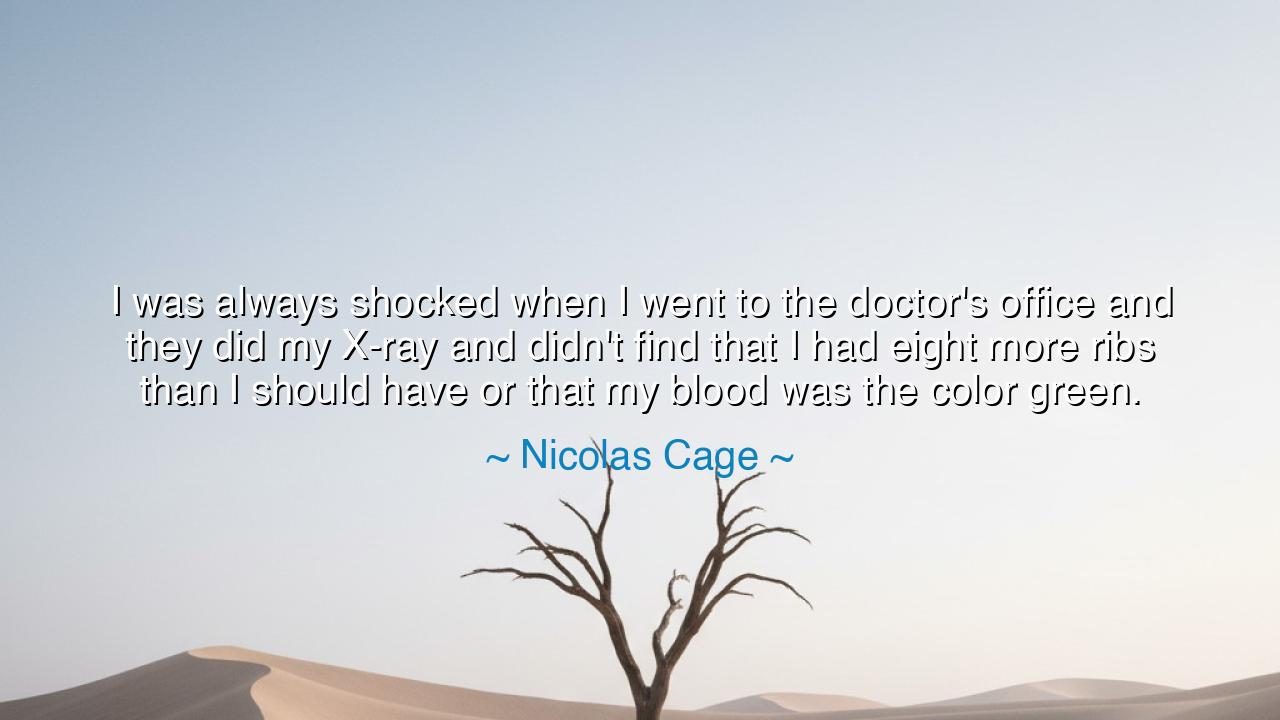
I was always shocked when I went to the doctor's office and they
I was always shocked when I went to the doctor's office and they did my X-ray and didn't find that I had eight more ribs than I should have or that my blood was the color green.






The words of Nicolas Cage—“I was always shocked when I went to the doctor’s office and they did my X-ray and didn’t find that I had eight more ribs than I should have or that my blood was the color green”—though spoken with a touch of eccentric humor, conceal within them a wisdom that echoes with the voices of the ancients. At first glance, they seem whimsical, the musings of an actor famed for strangeness. Yet beneath the jest lies a truth profound: that each human being, in the secret chambers of the heart, feels himself different, strange, even otherworldly. The body may appear common, but the spirit often whispers, “I am not as the rest.”
This sense of being “other” is not folly but the sign of the imagination at work, the fire that drives creation and daring. Cage’s surprise that the doctors found him ordinary is the cry of every soul that has felt greatness stir within. For who has not, in youth, believed themselves destined for something beyond the mundane, as though hidden within their flesh was a secret mark of destiny? The ancients called such a feeling the touch of the divine, the presence of a daemon guiding a person’s fate. Cage’s green blood and extra ribs are the symbols of this inner strangeness, the conviction that one is born with something unique that the world cannot measure by its instruments.
History is rich with such souls. Consider Joan of Arc, a peasant girl whose body showed no difference from her peers, yet within her burned voices and visions that lifted her to lead armies and alter the fate of nations. Physicians and skeptics of her time could find no mark upon her body, no green blood, no divine ribs. Yet she believed herself touched by Heaven, and in that belief she found courage to defy kings and generals. Her tale reveals that greatness often comes not from what the eye can see, but from the unseen fire within.
The lesson in Cage’s words is not merely about strangeness, but about embracing one’s individuality. Too often, the world presses upon us the weight of sameness, urging us to conform, to fit neatly into the X-ray’s results, to let our blood be red and our bones be counted as others’. But those who change the world—artists, leaders, prophets—are those who refuse to surrender the conviction of their uniqueness. They may laugh, as Cage does, at their imagined differences, but they also live in ways that honor the strange light within.
We must also be wary, however, not to let the sense of difference become prideful isolation. To believe your blood is green is one thing; to despise those whose blood is red is another. The ancients remind us that the gifts of uniqueness are not for self-worship but for service: the poet sings so that others may hear, the warrior fights so that others may live, the prophet speaks so that others may be guided. Thus, Cage’s strange confession is not madness but a call—find the strangeness within you, but let it serve the good of the world.
Practically, this means nurturing the parts of yourself that feel unusual, eccentric, or misunderstood. Do not bury them beneath shame or deny them because they do not appear in the doctor’s record. If your mind is restless, let it create; if your heart feels deeply, let it love and comfort; if your thoughts run contrary, let them challenge and refine the truth. Live as though you do have green blood, as though you do carry eight more ribs, for it is this sense of inward uniqueness that fuels courage, art, and discovery.
So let us heed Cage’s strange yet stirring words: though the world may measure us and declare us ordinary, we know the fire that burns unseen. Let no X-ray, no outward judgment, convince you that you are less than the destiny whispered in your soul. Walk, then, with the boldness of one whose blood runs green, whose frame carries hidden ribs, and whose spirit is set apart for a purpose. For in truth, each of us bears within a strangeness that, if embraced, may shine brighter than the common sun.






AAdministratorAdministrator
Welcome, honored guests. Please leave a comment, we will respond soon